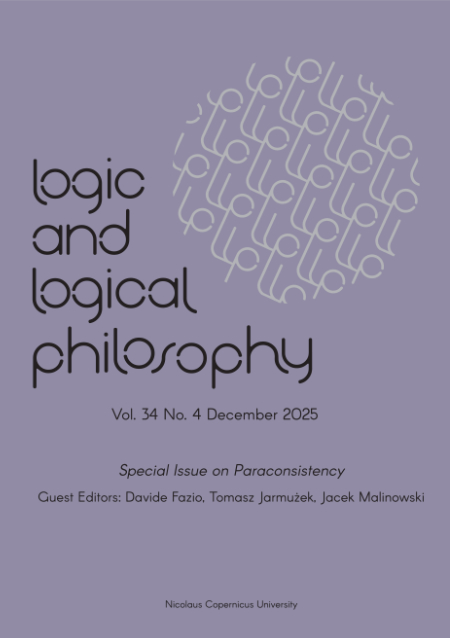Literal and Controllable Paraconsistency
DOI:
https://doi.org/10.12775/LLP.2024.027Słowa kluczowe
paraconsistent logic, Sette’s calculus, paraconsistency, paranormal logicsAbstrakt
The principle of explosion asserts that any formula can be derived from any pair of other contradictory formulas. Paraconsistent logic is typically regarded as a logic in which the universal validity of this principle is questioned. Therefore, a key point is determining when the validity can be considered universal to classify a logic as paraconsistent. A pertinent example to illustrate this point is the calculus CB1 that admits the principle but only for negated formulas, i.e., from any set {α, ∼α} any other formula follows if and only if α is of the form ∼γ. Another example is Sette’s calculus P1, which is paraconsistent at the level of variables but not complex formulas. Both serve as compelling examples of the so-called borderline cases.
In this paper, we examine several calculi expected to be paraconsistent at the level of literals. It means that a pair of formulas, α and ∼α, can yield any β if, and only if α is neither a propositional variable nor is its iterated negation. Furthermore, it is assumed that in some calculi presented here, β must adhere to specific restrictions. Once these conditions are satisfied, we refer to calculus as paraconsistent in a “controllable manner”.
Bibliografia
Araujo, A. L., E. H. Alves and J. A. D. Guerzoni, “Some relations between modal and paraconsistent logic”, Journal of Non-Classical Logic, 8, 1987: 33–44.
Avron, A., and I. Lev, “Non-deterministic multiple-valued structures”, Journal of Logic and Computation, 15(3), 2005: 241–261. DOI: https://doi.org/10.1093/logcom/exi001
Batens, D., and K. De Clercq, “A rich paraconsistent extension of full positive logic”, Logique et Analyse, 185–188, 2004: 227–257.
Carnielli, W. A., and M. E. Coniglio, Paraconsistent Logic: Consistency, Contradiction and Negation, Volume 40 of “Logic, Epistemology, and the Unity of Science”, Springer, Berlin–Heidelberg, 2016. DOI: https://doi.org/10.1007/978-3-319-33205-5
Carnielli, W. A., and M. Lima-Marques, “Society semantics and multiple-valued logics”, pages 33–52 in W. A. Carnielli and I. M. D’Ottaviano (eds.), Advances in Contemporary Logic and Computer Science: Proceedings of the Eleventh Brazilian Conference on Mathematical Logic, May 6-10, 1996, Salvador Da Bahia, Brazil, American Mathematical Society, 1999. DOI: https://doi.org/10.1090/conm/235
Carnielli, W. A., M. E. Coniglio, and J. Marcos, “Logics of formal inconsistency”, pages 1-93 in D. M. Gabbay and F. Guenthner (eds.), Handbook of Philosophical Logic, Vol. 14, 2nd edn., Springer, 2007. DOI: https://doi.org/10.1007/978-1-4020-6324-4_1
Ciuciura, J., “On the system CB1 and a lattice of the paraconsistent calculi”, Logic and Logical Philosophy, 29, 2020: 223–237. DOI: https://doi.org/10.12775/llp.2019.035
Ciuciura, J., “Sette’s calculus P1 and some hierarchies of paraconsistent systems”, Journal of Logic and Computation, 30(5), 2020:1109–1124. DOI: https://doi.org/10.1093/logcom/exaa030
Da Costa, N. C. A., and E. Alves, “A semantical analysis of the calculi Cn”, Notre Dame Journal of Formal Logic, 18, 1977: 621–630.
Da Costa, N. C. A., and J.-Y. Béziau, “Carnot’s logic”, Bulletin of the Section of Logic, 22(3), 1993: 98–105.
Fernández, V. L., and M. E. Coniglio, “Combining valuations with society semantics”, Journal of Applied Non-Classical Logics, 13, 2003: 21–46. DOI: https://doi.org/10.3166/jancl.13.21-46
Hiż, H., “Extendible sentential calculus”, The Journal of Symbolic Logic, 24(3), 1959: 193–202. DOI: https://doi.org/10.2307/2963776
Karpenko, A. S., and N. Tomova, “Bochvar’s three-valued logic and literal paralogics: Their lattice and functional equivalence”, Logic and Logical Philosophy, 26, 2017: 207–235. DOI: https://doi.org/10.12775/llp.2016.029
Lewin, R. A., and I. F. Mikenberg, “Literal-paraconsistent and literal paracomplete matrices”, Mathematical Logic Quarter, 52, 2006: 478–493. DOI: https://doi.org/10.1002/malq.200510044
Loparić, A., and N. C. A. Da Costa, “Paraconsistency, paracompleteness and induction”, Logique et Analyse, 29(113), 1986: 73-80.
Loparić, A., “A semantical study of some propositional calculi”, The Journal of Non-classical Logic, 3, 1986: 73–95.
Marcos, J., “On a problem of da Costa”, pages 53–69 in G. Sica (ed.), Essays on the Foundations of Mathematics and Logic, Vol. 2, Polimetrica: Monza, Italy, 2005.
Marcos, J., “Nearly every normal modal logic is paranormal”, Logique et Analyse, 189–192, 2005: 279–300.
Mruczek-Nasieniewska, K., and M. Nasieniewski, “Syntactical and semantical characterization of a class of paraconsistent logics”, Bulletin of the Section of Logic, 34(4), 2005: 229–248.
Nowak, M., “A note on the logic CAR of Da Costa and Béziau”, Bulletin of the Section of Logic, 28(1), 1999: 43–49.
Odintsov, S. P., “The class of extensions of Nelson’s paraconsistent logic”, Studia Logica, 80, 2005: 291–320. DOI: https://doi.org/10.1007/s11225-005-8472-9
Odintsov, S. P., “On representation of N4-lattices”, Studia Logica, 76, 2004: 385–405. DOI: https://doi.org/10.1023/b:stud.0000032104.14199.08
Omori, H., “Sette’s logics, revisited”, pages 451–465 in A. Baltag, J. Seligman and T. Yamada (eds.) Logic, Rationality, and Interaction. 6th International Workshop, LORI 2017, Sapporo, Japan, September 11–14, 2017, Proceedings, Springer, 2017. DOI: https://doi.org/10.1007/978-3-662-55665-8_31
Parson, Ch., “A propositional calculus intermediate between the minimal calculus and the classical”, Notre Dame Journal of Formal Logic, 7(4), 1966: 353–358. DOI: https://doi.org/10.1305/ndjfl/1093958754
Pogorzelski, W. A., and P. Wojtylak, Completeness Theory for Propositional Logics. Studies in Universal Logic, Birkhäuser: Basel, 2008.
Puga, L. Z., and N. C. A. da Costa, “On the imaginary logic of N. A. Vasiliev”, Mathematical Logic Quarter, 34, 1988: 205–211.
Sette, A. M., “On the propositional calculus P1”, Math. Jpn., 18, 1973: 89–128.
Pobrania
Opublikowane
Jak cytować
Numer
Dział
Licencja
Prawa autorskie (c) 2024 Janusz Ciuciura

Utwór dostępny jest na licencji Creative Commons Uznanie autorstwa – Bez utworów zależnych 4.0 Międzynarodowe.
Statystyki
Liczba wyświetleń i pobrań: 1251
Liczba cytowań: 0







